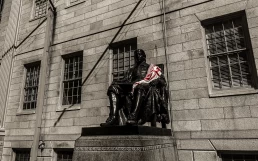To survive fascist attacks, universities must commit to a future in which they serve the people, not the elite.
By David Palumbo-Liu, Academe Blog
After Columbia University’s craven and apparently futile acceptance of all the conditions Donald Trump set before it to even start a conversation about getting its federal funding back, Harvard’s recent refusal to let the federal government insinuate itself into the core functions of higher education was a welcomed moment we should all celebrate. It is a sign of the times that when an internationally-renown university tells a US president that “no, you do not get to tell us what to research, what to teach, what language we may use, and, in fact, what to think, it’s unacceptable,” the world reacts as if this were miraculous. It may be a miracle, but it is far from enough. Last week’s National Day for Action in Higher Education, organized by the Coalition for Action in Higher Education (CAHE) and cosponsored by a slew of other progressive and radical organizations, provided an essential counter-balance to many of the deficiencies in Harvard’s action.
First, let me recognize and fully support Harvard’s insistence that Trump’s holding Harvard and other universities hostage to his unfriendly takeover has had an immediate and lasting effect on scientific research (medical and otherwise) that serves the public good not only of the United States, but also of the world. We are talking about research into Alzheimer’s disease, heart disease, cancer, diabetes, and other causes of human suffering and death. Using people’s health and lives as bargaining chips is abhorrent.

The problem, however, is that to foreground that, it is too easy to push other public concerns into the background, if not to erase them altogether. It is as if justice were a zero-sum enterprise.
This was driven home to me when a colleague in the Stanford School of Medicine said that they had had five grants revoked, but that, after reapplying, got two back. This to them was an “acceptable new norm.” But besides the fact that batting 400 is only a cause for celebration in Major League Baseball, I was struck by what followed—“at least I am in ear, nose, and throat. Think of my colleagues in obstetrics-gynecology.” Catching the drift, I offered, “yes, but think of me, I teach about race and ethnicity.” It’s true—to even convene an ordinary class, I put myself in danger of being accused of committing what Jesse Hagopian calls in his book, Teach Truth, a “truth crime,” such as stating the fact that this country (and others) were founded on the misery and labor of those subjected to slavery and settler colonialism.
Too many of the new militants for restoring research funding have said nothing meaningful at all, much less organized around, the systemic nature of Trump’s attack. It’s great, I suppose, if you get two of five grants back that Congress gave you, but is it worth remaining silent about the fact that you are sacrificing others by remaining inactive regarding their unabated suffering and persecution? This is one way fascism works—one becomes complicit and willing to name names if one thinks one is safe. But once the protections of law, institutional integrity, and academic freedom and free speech are taken from one group, one could steer an ocean liner through the gaping hole now staring us in the face—it is a vortex that can engulf anyone.
In contrast, CAHE’s National Day of Action was for everyone, because at its core it recognized all the things I have mentioned. Just take a look, for examples, at the flyers for the following events organized on three separate campuses (and there were events on as many as two hundred campuses nationwide).
Prior to the events on April 17, I interviewed three of the organizers for my podcast. Three points came out that were threaded throughout the daylong series of webinars and thousands of events throughout the country.
First—it is both illogical and immoral to deny that the most egregiously affected group has been Palestinians, Arabs, Muslims, and supporters of Palestine—they have been arrested, detained, had visas revoked, denied due process. Cynically using the Trojan Horse of “antisemitism” to force his way on to campus and into university administration buildings, Trump knows that no one dare object, lest they themselves be targeted as being antisemitic. It is a new form of McCarthyism. It’s worse, in fact, because it takes a legitimate and important concern and instrumentalizes it, leeching it of all meaning.
Second—organizers pointed out that these attacks were part of a much larger project of privatizing education, and nearly everything else (think social security, health care, alongside education). Instead of resources geared toward the public good, as determined by the people ourselves, Trump, Musk, and MAGA want available only their private brand of each, aimed solely toward enriching the oligarchy. Think Trump University, Trump Bible, or Cybertrucks for “public” transportation.
Finally, and perhaps most importantly, organizers spoke of the National Day and all that will follow as a “utopian project.” By that they mean it’s a hopeful, collaborative project to create a space for free education, publicly-supported, no-strings attached research, and a devotion to the common public good which includes free health care, meaningful work, full retirement benefits, and more. In one webinar, A. Naomi Paik argued for something more capacious than academic freedom—she demanded a democratic decolonial university and solidarity without exception. And Christopher Newfield reminded us of the ethical, existential obligation to know things, and an education designed to help everyone of all backgrounds and interests to build the personal lives they came to understand as meaningful.
Universities have not fallen out of favor because they are “woke.” They have fallen out of favor because they are removed from the everyday lives of most people. To survive in any meaningful form, they need to commit to and agitate for all people, most especially the ones left out on purpose.
David Palumbo-Liu is the Louise Hewlett Nixon Professor and professor of comparative literature at Stanford. His most recent book is Speaking Out of Place: Getting Our Political Voices Back (Haymarket). He has a podcast with the same name.
Recent Posts
The Chilling Truth Behind ICE’s Detention Warehouses
March 5, 2026
Take Action Now “The idea that the Trump administration wants to hold human beings inside of warehouses like packages at logistic facilities like…
As Security Council Stalls, There Are Other Ways to Stop U.S.-Israeli War on Iran
March 3, 2026
Take Action Now A “Uniting for Peace” resolution in the UN General Assembly can counter the Security Council’s failure to act.By Marjorie Cohn,…
States Can Block the Paramount-Warner Deal
March 3, 2026
Take Action Now But thanks to some clever maneuvering, they are already running out of time.By David Dayen, The American Prospect What started as…
Congress, Do Your Job and End This Illegal War of Aggression By The U.S. and Israel
March 2, 2026
Take Action Now Congress must assert its Constitutional authority over matters of war and peace against an out-of-control, rogue president and…




